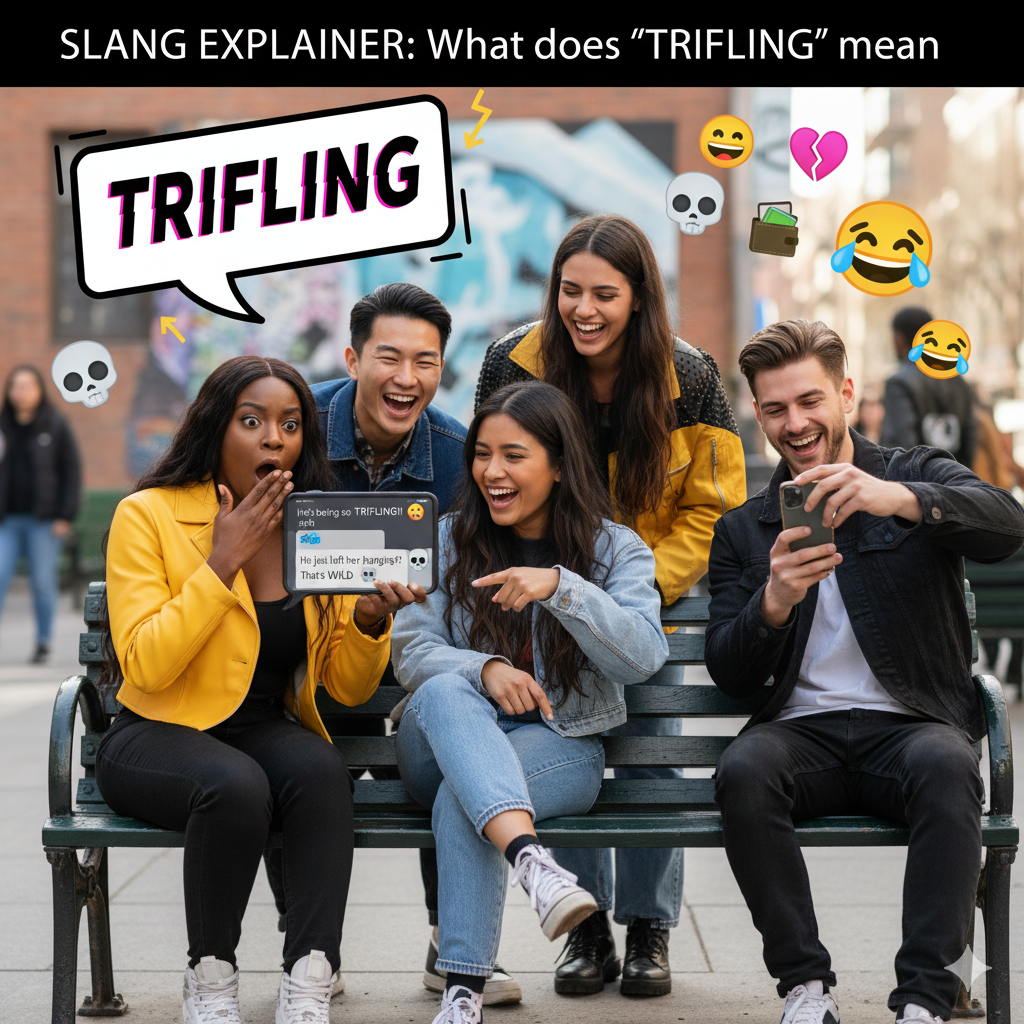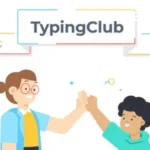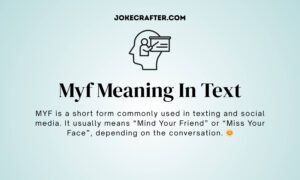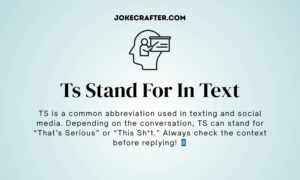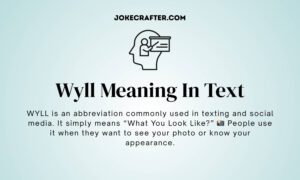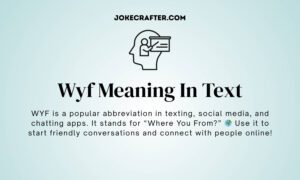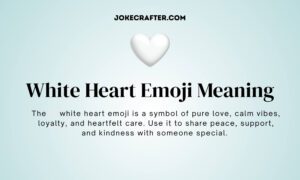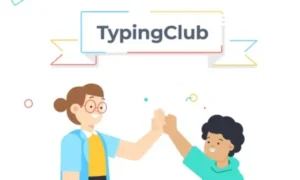Language never stands still — it evolves with every generation, meme, and trend. One word that’s been revived and redefined in recent years is “trifling.” You’ve probably heard it in songs, seen it in viral TikToks, or maybe had someone throw it your way in a text. But what exactly does “trifling” mean in slang?
This guide breaks down the modern meaning, origins, examples, and cultural influence of the word, showing how it shifted from old-fashioned English to everyday internet talk. Whether you’ve been called triflin’ or you’re just trying to keep up with slang, here’s everything you need to know.
The True Meaning of “Trifling” in Slang
In modern slang, “trifling” (or “triflin’”) describes someone who’s petty, lazy, fake, or generally not worth your time. It’s a word for people who act shady, irresponsible, or disrespectful — especially when they pretend to care but don’t follow through.

For example:
“He keeps saying he’ll call but never does — that’s triflin’.”
“She started drama just for attention — so triflin’.”
Essentially, a trifling person doesn’t take things seriously — whether it’s friendships, work, or relationships.
According to the Oxford English Dictionary, the word “trifle” dates back to the 14th century and originally meant something of little importance. Over time, African American Vernacular English (AAVE) redefined it, turning “trifling” into a powerful term for people who waste time, disrespect others, or bring unnecessary drama.
Origins and Evolution of “Trifling”
“Trifling” has deep roots in English — even Shakespeare used it to mean “insignificant.”
Example from Hamlet:
“For some must watch, while some must sleep; So runs the world away, / Would not this, sir, be a trifling dream?”
Fast forward a few centuries, and African American communities transformed the term through cultural expression, particularly in blues and R&B.
By the 1990s, artists like TLC popularized it in songs such as “No Scrubs”, which famously called out “triflin’ guys.” From there, the slang caught on across pop culture, eventually becoming a mainstay in internet speech and meme culture.
Today, it’s commonly used on Twitter (X), TikTok, and in texting — usually to call someone out for being fake, unreliable, or petty.
What Does “Trifling” Mean in Text Messages?
If you’ve seen “trifling” in a text or DM, it’s probably not a compliment.
When someone says, “You’re triflin’,” they usually mean:
You’re being shady, fake, or insincere.
You did something petty or immature.
You’re acting lazy or careless.
Example:
Friend 1: “You really didn’t tell me about the party?”
Friend 2: “Girl, you’re triflin’ for that.”
In casual text conversations, tone matters. The word can be playful among friends — like teasing someone for forgetting plans — or harsh when calling out serious behavior. Context decides everything.
Trifling in Relationships: A Red Flag Term
In dating and relationships, calling someone “trifling” is a serious accusation. It suggests a lack of respect, loyalty, or maturity.

Here’s how it often appears:
Ignoring texts or ghosting: “He’s so triflin’, can’t even reply.”
Lying or manipulating: “She pretends to care, but she’s triflin’ inside.”
Cheating or playing games: “I’m done with triflin’ people wasting my time.”
Psychologists note that slang like trifling acts as shorthand for emotional boundaries — it helps people name toxic behavior quickly. Instead of explaining in detail that someone is unreliable or fake, the slang word says it all.
So, when someone calls out trifling behavior, it’s not just slang — it’s emotional clarity in one word.
How “Trifling” Appears in Pop Culture
You can find trifling’s evolution across decades of music, movies, and memes.

1990s: R&B and hip-hop artists used it to call out unreliable lovers or fake friends.
2000s: Sitcoms and teen dramas made it mainstream.
Today: TikTok trends use “triflin’ energy” as a joking way to expose bad behavior.
A viral example from Twitter:
“My ex texted me after six months talking about ‘miss u.’ Boy, don’t start that triflin’ nonsense.”
This casual, humorous usage shows how trifling has become part of online storytelling — a way to mix humor with emotional truth.
Trifling vs. Other Slang Terms
While “trifling” means not worth your time, it overlaps with several other slang terms.
| Slang Term | Meaning | Similarity to Trifling |
|---|---|---|
| Shady | Sneaky, dishonest | Often interchangeable |
| Petty | Overly concerned with small issues | Trifling people are often petty |
| Fake | Insincere or two-faced | Common synonym |
| Lazy | Not putting in effort | A trifling trait |
| Messy | Loves drama | Very close in tone |
Each has its nuance, but “trifling” carries attitude — it doesn’t just describe behavior; it judges it.
Real-Life Examples of Trifling Behavior
Sometimes, it’s easier to spot trifling energy than define it. Here are a few examples:
Friendship: Cancelling plans last minute — repeatedly.
Work: Taking credit for someone else’s project.
Family: Borrowing money and “forgetting” to pay it back.
Dating: Flirting with others while pretending to be loyal.
Online: Subtweeting instead of addressing issues directly.
Each example fits the trifling template — selfish, dishonest, or lazy actions wrapped in excuses.
How to Respond When Someone Calls You “Trifling”
If someone calls you trifling, pause before reacting. Sometimes it’s playful; sometimes it’s not.
Ask yourself:
Are they joking, or is there truth behind it?
Did I act unreliable or disrespectful?
How can I fix the situation if it’s serious?
Being called trifling isn’t the end of the world — it’s a chance for reflection.
And if someone’s being trifling toward you, it’s okay to set boundaries or walk away. Protect your peace.
Why “Trifling” Matters in Modern Slang
Language like trifling doesn’t just describe — it empowers.
It gives people a way to identify toxic or unserious behavior quickly and confidently.
Sociolinguists note that slang terms born from AAVE (African American Vernacular English) often express complex social ideas with just one word. “Trifling” captures laziness, deceit, and lack of accountability in one punchy term — which is why it sticks.
In short, understanding slang like trifling helps you:
Communicate better online and in person.
Understand cultural nuances and humor.
Avoid misunderstandings across communities.
Final Thoughts: Why Knowing the “Trifling Meaning in Slang” Matters
Language reflects culture, and “trifling” is proof of that evolution.
From Shakespeare’s plays to TikTok rants, it’s a word that’s traveled centuries — changing meaning but keeping its bite.
When someone says “you’re triflin’,” they’re not just throwing shade. They’re calling out behavior that disrespects effort, time, or honesty.
Knowing what it means helps you understand tone, avoid offense, and recognize red flags in relationships or friendships.
So the next time you hear the term, you’ll know whether it’s a playful joke or a pointed critique — and that’s the true power of language awareness.
David is the creative mind behind jokes Crafter, a hub for clever jokes, witty wordplay, and laugh-out-loud content. With a passion for humor and a knack for crafting the perfect punchline, David brings smiles to readers across the globe. When he's not writing, he's probably thinking up his next viral joke or enjoying a good comedy show.
